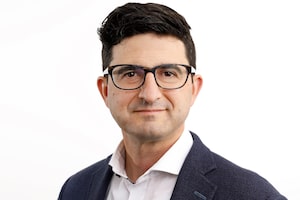
Mike Silagadze in Toronto on June 30, 2020.Peter Power/The Globe and Mail
Mike Silagadze survived what he calls a sectorwide “atom bomb” – the blow-up of cryptocurrency exchange FTX Trading Ltd. – scathed and chagrined, but not critically harmed.
The Toronto entrepreneur, best known for building online textbook company Top Hat, last year founded Grand Cayman-based Gadze Finance to invest in the crypto space. As FTX’s high-profile meltdown started this month, Gadze had US$5.4-million of its roughly US$40-million in assets held in custody within the exchange, where it was short-selling cryptocurrencies as part of a hedging strategy.
Within days, Gadze tried to pull out its assets. But it was too late, Mr. Silagadze said. Now, that money, in the form of fiat currency, is tied up in FTX’s bankruptcy proceedings.
Although Mr. Silagadze hopes Gadze might get back 20 to 50 cents on the dollar, it likely will not happen for years, he said. He estimates his fund will sustain a 10- to 15-per-cent hit.
“I went through all the stages of grief,” Mr. Silagadze said in an interview. “Mostly, I feel awful for our investors. I feel I let people down because I was supposed to be protecting their money – and my own.”
Mr. Silagadze believes he has lost more than US$1-million personally.
The loss may sound like a relatively modest hit from a historic wipeout; it’s certainly not a fund-killer. But Mr. Silagadze had pitched Gadze as a relatively safe bet in the Wild West of crypto, a low-risk yield fund that could generate 10 to 12 per cent a year.
The fund did not invest directly in cryptocurrencies, so as to protect itself from fluctuating prices. It provided liquidity to crypto exchanges and earned a yield in return, a process referred to as “yield-farming” in the industry, which Mr. Silagadze had even called a “boring way to invest in crypto” at the time of his launch.
Gadze was also backed by prominent Canadian crypto investors: Boris Wertz’s Version One Ventures, Som Seif’s Purpose Investments and Toronto entrepreneur brothers Michael and Richard Hyatt.
Things were going according to plan, Mr. Silagadze said. Then, Bahamas-based FTX imploded.
The collapse of what was the second-largest crypto exchange in the world has left more than one million registered customers and other investors facing losses in the billions of dollars.
“We worked so hard to mitigate risk, we were meticulous. All of our trading strategies did exactly what they were supposed to do and worked well,” Mr. Silagadze said, adding that the fund was consistently returning a handful of basis points daily.
“As investors we were all happy,” Michael Hyatt said in an interview. “What we didn’t see was the counterparty risk of a giant like FTX being a bad player.”
FTX filed for bankruptcy in Delaware on Nov. 11. Last week, FTX said it owes its 50 biggest creditors nearly US$3.1-billion. It is believed to have funnelled customer assets into risky bets through an affiliated trading firm.
Mr. Silagadze said he initially had “a sense of complete disbelief” as the FTX saga unfolded. He had chosen to primarily transact through FTX because he thought it was a more secure and reputable platform than other exchanges. It was managed by a high-profile crypto leader, Sam Bankman-Fried, who gallivanted with politicians in Washington, D.C., and had big-name investors, such as Sequoia Capital and Tiger Global Management.
Now, however, Mr. Silagadze is particularly angry at FTX investors, including Ontario Teachers’ Pension Plan, which invested US$95-million in FTX, for giving it credibility.
“What kind of diligence does Teachers do if they invest in this? Did they not look at their books? Did they not see the exposure they had?” Mr. Silagadze said. Teachers was “clearly asleep at the wheel.”
In a previous statement, Teachers spokesperson Dan Madge said the fund conducts “robust due diligence on all private investments.” Teachers will write down its investment in FTX to zero by year-end.
But Mr. Silagadze isn’t deflecting blame and he wants to be clear: He knows he messed up.
“Obviously we were wrong about the risks we were taking,” he said. “We could have been more careful, we could have made sure we had less exposure to FTX.”
He said nearly all of his 65 investors have been understanding and supportive. “He’s in constant communication and working extremely hard to fix a wrong for investors,” Mr. Hyatt said.
Mr. Wertz added: “Mike handled this super well, there was nothing reckless that he did. He thought this was a safe exchange, like many other people. His take-away, which is the take-away for the over all crypto market, is don’t trust centralized entities unless they’re regulated.”
Mr. Seif of Purpose Investments, which launched Canada’s first Bitcoin ETF in early 2021, said FTX is not representative of the crypto industry. “Unfortunately, it is wrongly being reflected upon crypto as a whole, carrying forward this narrative that crypto sucks and that the whole thing is a sham when it really is not.”
Mr. Silagadze said while he briefly second-guessed his future with crypto, he is “still bullish” on the space. “I will definitely continue, rebuild and change strategies,” he said.
He is shifting the strategy of his Market Neutral USD Fund to take on higher risks in the hopes of getting higher returns. “The things we’re doing now are more interesting and have higher upside than what we were doing before,” he said.
“If there’s anything I can say about Mike it is that he has an incredible drive to succeed and figure things out. And he will not give up,” said Mr. Wertz. “This certainly throws you back and it’s a hard experience, but he will come back stronger.”
 Sean Silcoff
Sean Silcoff Temur Durrani
Temur Durrani